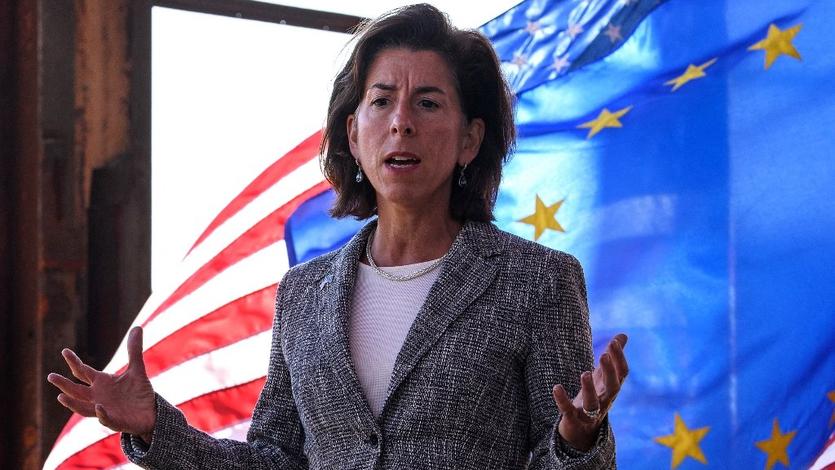 US Secretary of Commerce Gina Raimondo speaks to the press during the inaugural US-EU Trade and Technology Council in Pittsburgh, Pennsylvania, on Sept 29, 2021. (NICHOLAS KAMM / AFP)
US Secretary of Commerce Gina Raimondo speaks to the press during the inaugural US-EU Trade and Technology Council in Pittsburgh, Pennsylvania, on Sept 29, 2021. (NICHOLAS KAMM / AFP)
Washington seems increasingly in the grip of paranoia, believing that any country that is not pro-US must be pro-China. That is making it the largest saboteur of development and stability in the Asia-Pacific.
In an economic forum in Singapore last week, US Commerce Secretary Gina Raimondo revealed the US plan to build a new economic framework for the Indo-Pacific region next year, adding that the United States will not re-enter the Comprehensive and Progressive Trans-Pacific Partnership pact.
Almost at the same time, the US and Japan declared that they are building a new type of trade partnership, stressing their shared concerns about a "third country".
It seems that the Joe Biden administration is staking out path for what it deems to be "fair competition", oblivious to the contradiction between its words and deeds.
The administration should not turn a deaf ear to the speech Singaporean Prime Minister Lee Hsien Loong delivered at the forum, in which he openly opposed the decoupling of the Chinese and US economies, and denied the possibility that the world economy can be divided into two exclusive and independent economic clubs. He compared the world's two largest economies to Siamese twins, and said it is not possible for two separate systems to be formed.
This should be taken as representing the common view of Southeast Asian countries.
Rather than ASEAN cutting its ties with China as Washington urges, the connections between China and the ASEAN members have only strengthened, especially during the COVID-19 pandemic, with China and ASEAN becoming each other's largest trade partner.
Yet although its overtures for the bloc to give China a cold shoulder have repeatedly been rebuffed, Washington keeps trying to cajole the Association of Southeast Asian Nations to side with it against China because of the economic and strategic importance of ASEAN to China.
As State Councilor and Foreign Minister Wang Yi pointed out in a video speech at a think tank forum on Saturday, the Asia-Pacific region is the most robust and united growth engine in the world and should collectively boycott any efforts to form cliques.
That President Xi Jinping will attend a virtual meeting marking the 30th anniversary of the establishment of the China-ASEAN dialogue relations in Beijing on Monday is sure to inject new vitality into the development of bilateral ties.
The meeting is expected to boost the upgrading of China-ASEAN relations, and it is anticipated that the two sides will make new progress in their common objective of forming a closer community with a shared future.
Instead of trying to form cliques, the US should abandon its I-win-you-lose approach and strive to play a constructive role in promoting greater regional economic integration.
To try and drive a wedge between China and its major strategic and trade partner will only undermine a key guardrail for Sino-US relations.


